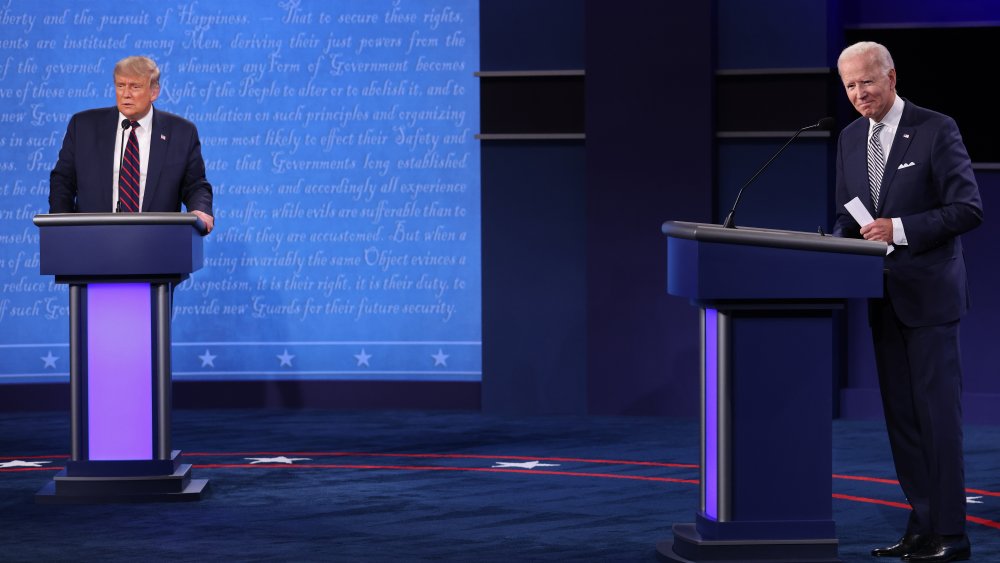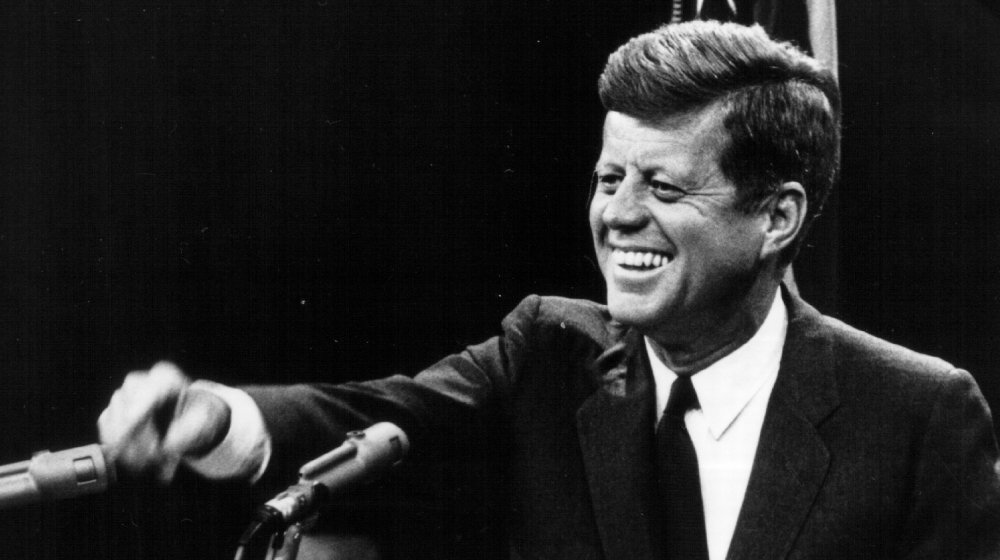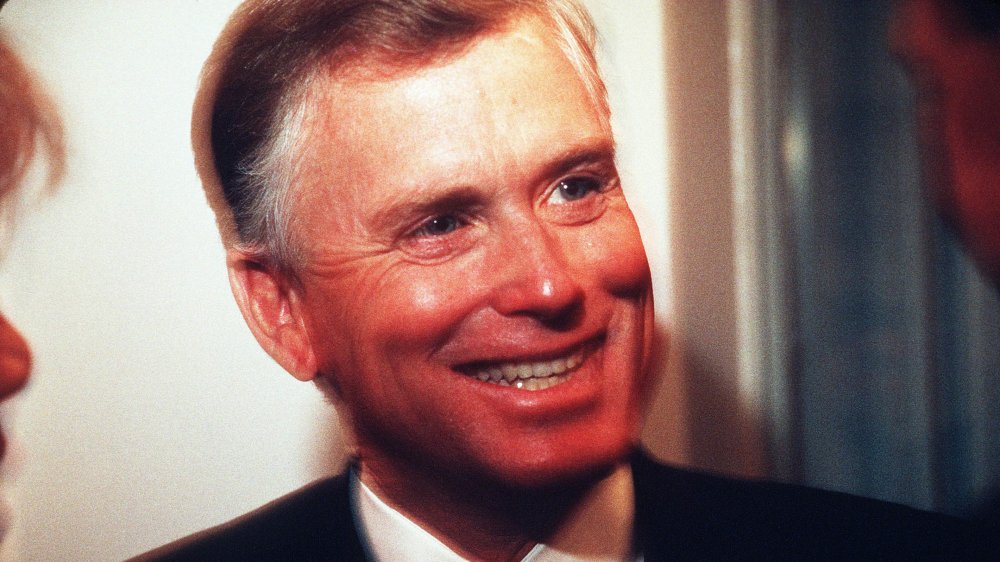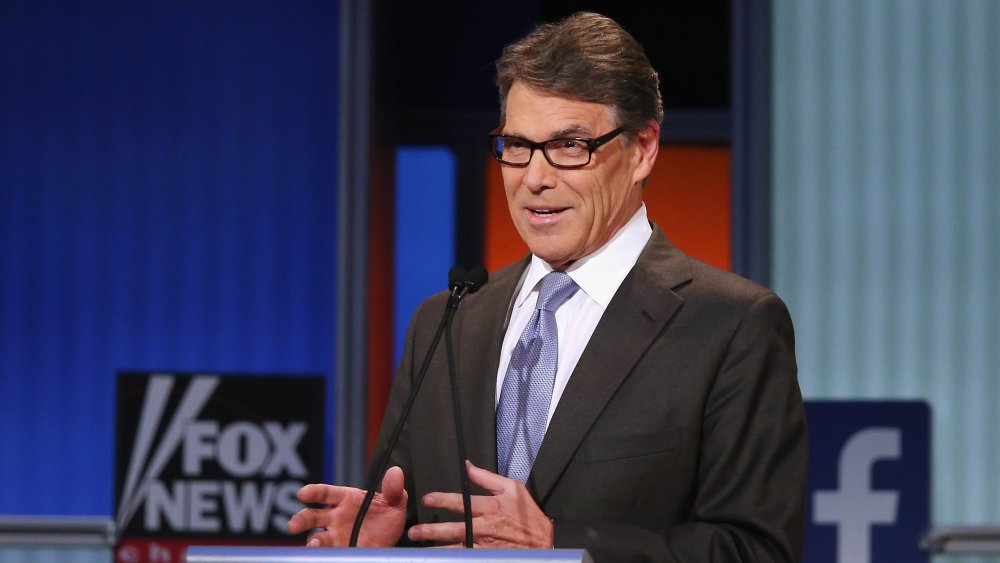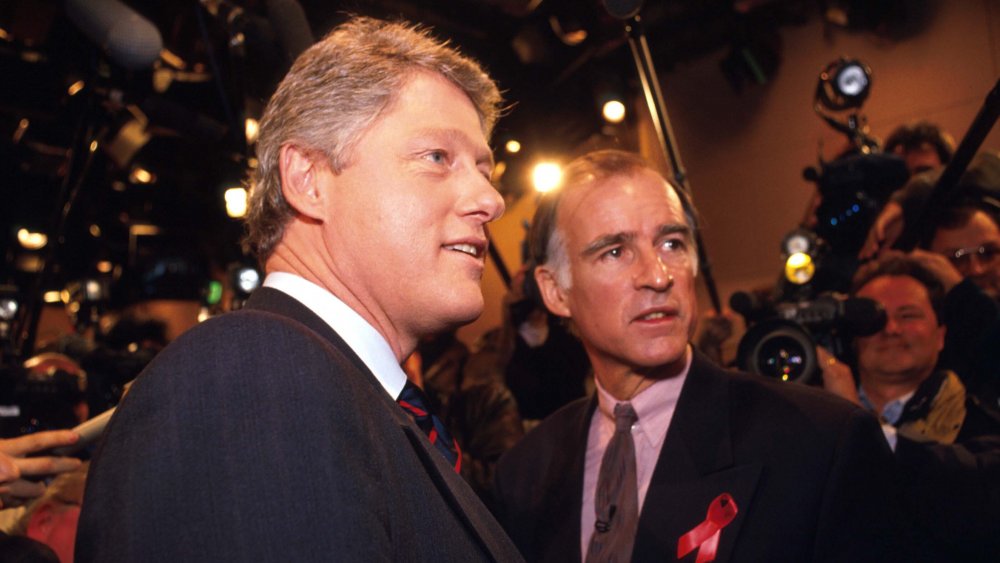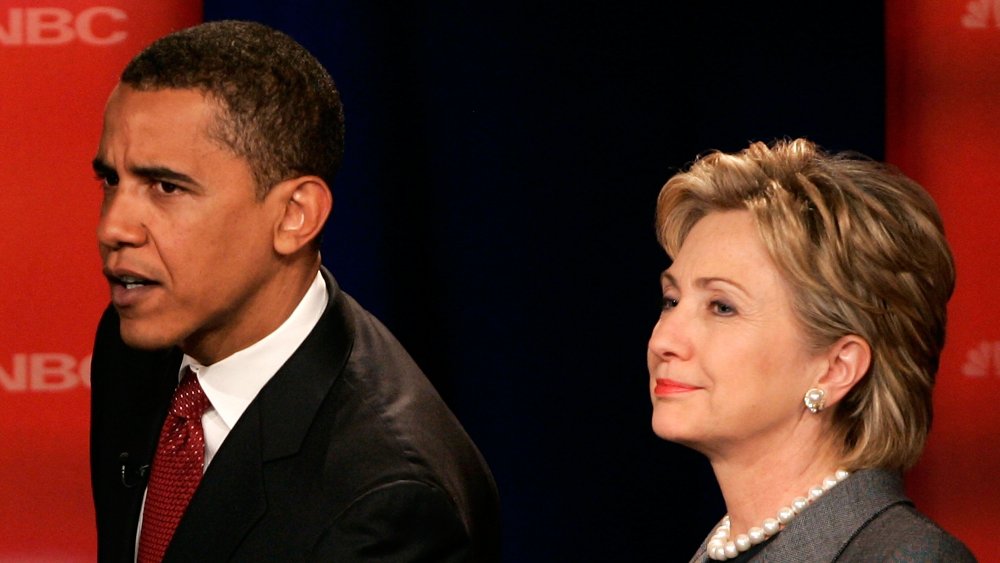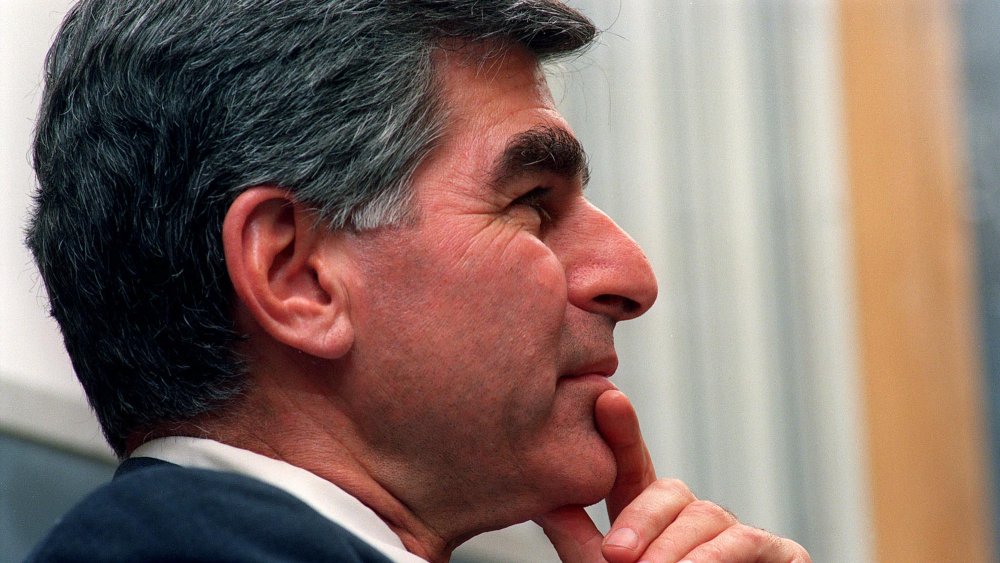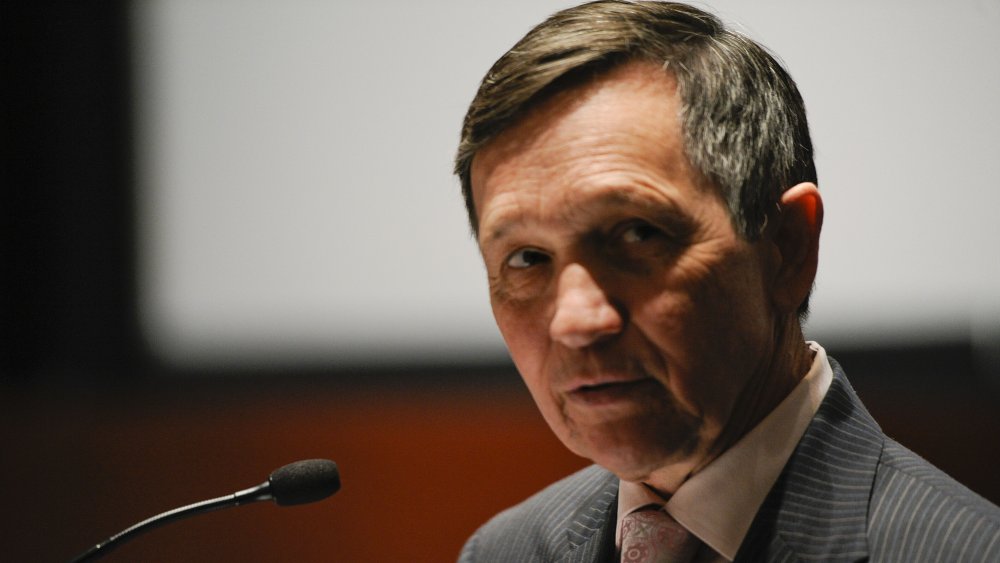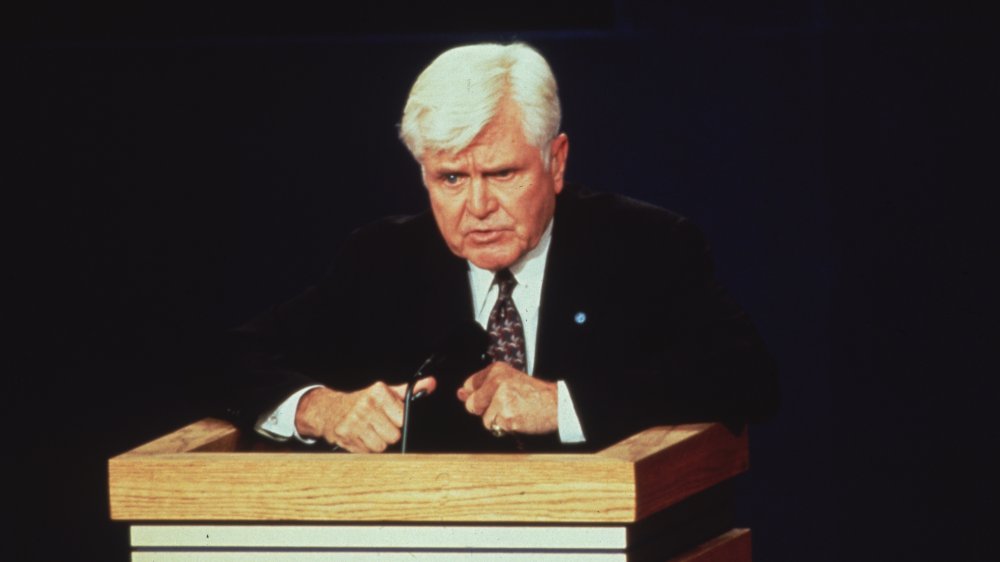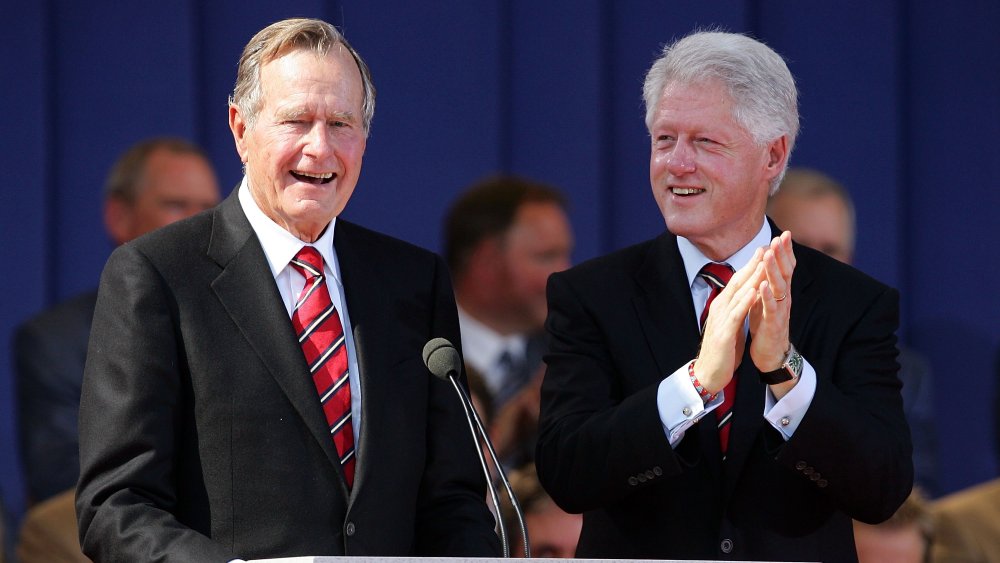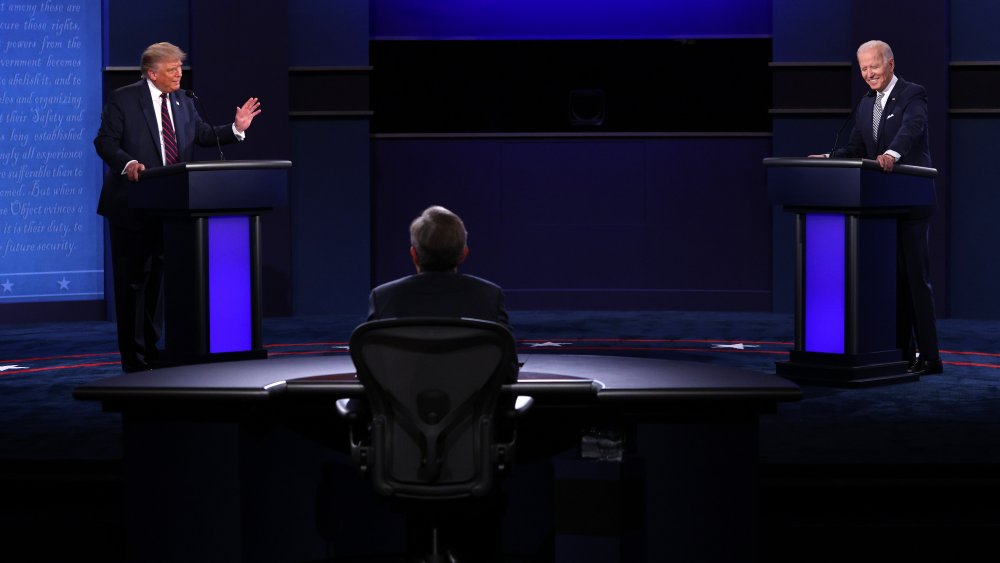The Worst Moments In Presidential Debate History
Besides sports, American political debates are the original reality television. Whether it be two candidates vying to be the most powerful person in the world, or two candidates trying to prove they would be a capable backup, these debates are must-see television for millions and allow media political pundits to call their favorite horse race. But do they really matter?
In his study "Political Learning from Presidential Debates," political scientist Thomas Holbrook found, much like with everything else, you never get a second chance to make a first impression. "The evidence overwhelmingly indicates that the most important debate, at least in terms of information acquisition, is the first debate," he wrote (via Journalist's Resource). "The first debate is held at a time when voters have less information at their disposal and a larger share of voters are likely to be undecided."
And nothing proves Holbrook's point more than most of these examples below. So have a seat, grab some popcorn, and witness some of the worst moments in Presidential debate history.
Television made John F. Kennedy a star
The first debate between President Nixon and his upstart Democratic challenger John F. Kennedy that took place on September 26, 1960, was the first televised presidential debate in American history. According to Time, "88% of American households had televisions — up from just 11% the decade before," and it is estimated that 74 million watched the debate. That proved to be very bad for Nixon, who at the time was recovering from an illness. "Nixon, pale and underweight from a recent hospitalization, appeared sickly and sweaty, while Kennedy appeared calm and confident," Time reported.
The historic debate showed the power of new technology. "Those who listened to the debate on the radio thought Nixon had won," Time continued. "Those that watched the debate on TV thought Kennedy was the clear winner." The influence of the television medium so tilted the election that another televised debate didn't occur again for another 16 years. "You couldn't wipe away the image people had seared in their brains from the first debate," media historian and professor Alan Schroeder said.
"I think Kennedy knew the power of television and he was so unbelievably good-looking and relaxed and casually cool, that it was a perfect medium for him," said Ted Sorensen, Kennedy's policy and speech adviser (via ABC), adding, "He didn't know Nixon would look and do so badly in the debate." Kennedy went on to win the 1960 election by 84 electoral votes.
Dan Quayle never recovered from Lloyd Bentsen's mic drop moment
On October 5, 1988, Senator Dan Quayle, the 41-year old running mate of George H.W. Bush, faced off against WWII hero and running mate of Democratic nominee Michael Dukakis, Senator Lloyd Bentsen. The debate was the standard affair until debate moderators pressed Quayle, due to his relative inexperience, a third time on his preparedness to step into the role of President if Bush died in office.
The Republican candidate then compared himself to one of the most beloved Democratic politicians of all-time – John F. Kennedy. "I have far more experience than many others that sought the office of vice president of this country," Quayle answered. "I have as much experience in the Congress as Jack Kennedy did when he sought the presidency." Then Bentsen, who also seemed angry at Quayle's comparison, delivered one of the most memorable clap backs in debate history: "I served with Jack Kennedy. I knew Jack Kennedy. Jack Kennedy was a friend of mine. Senator, you're no Jack Kennedy." The crowd erupted with applause, leaving Quayle to meekly reply, "That was really uncalled for, Senator."
Although Bush and Quayle went on to win in an electoral landslide, Quayle never recovered from his debate performance, and his political career was over after Bush was defeated by Bill Clinton in 1992. When Quayle said he would be a "pit bull" during that election's campaign, Clinton replied, "That's got every fire hydrant in America worried" (via NPR).
Rick Perry killed his 2012 election hopes with an 'oops'
During the 2012 Republican presidential primary debates, Governor Rick Perry was laying out his plan to balance the budget with the usual Republican strategy of slashing regulations and entire government agencies. However, he had some trouble naming which agencies he would eliminate if he was elected president. "It's three agencies of government when I get there that are gone: commerce, education, and the uh ... what's the third one, there? Let's see," he said to laughter from the audience. When pressed by the moderator to name three, he stumbled through the first two again, then replied, "I can't. The third... Oops."
At that moment, Perry's bid for the White House was embarrassingly over. "We witnessed a political suicide live on national television," former John McCain adviser, Mark McKinnon declared (via The Guardian). In an article for Daily Beast, Republican strategist McKinnon went even further. "Perry is now a dead man walking. He'll go through the motions to save face, but he won't get a single new voter. And he will quickly lose the ones he had. Once they're laughing at you, you're finished," he wrote. Yikes.
Three years after his debate debacle, Perry sat down with CNBC and explained "one of the errors" he made was not as being prepared as he should have been. "I was a little arrogant, and that had as much to do with my demise as a candidate as forgetting a third agency of government."
Bill Clinton and Jerry Brown get heated
Tempers flared during the 1992 Democratic primary debate when former California governor Jerry Brown accused then-Arkansas Governor Bill Clinton of "funneling money to his wife's law firm for state business." The Clintons have faced accusations of corruption and conflicts of interests for almost the entirety of their political careers, but instead of denying the charge, an angry Clinton fired back at Brown for attacking Hillary. "Let me tell you something, Jerry. I don't care what you say about me ... but you ought to be ashamed of yourself for jumping on my wife. You're not worth being on the same platform with my wife," Clinton responded.
"Jerry comes here with his family wealth and his $1,500 suit and makes a lying accusation about my wife," Clinton continued. "I never funneled any money to my wife's law firm — never." The two men devolved into pointing fingers at each other before being talked down by the moderator. According to Politico, the feud between the two men lasted well into the next century with Brown saying in 2010, "Clinton's a nice guy, but who ever said he always told the truth?"
However, in 2016, Brown endorsed Hillary instead of her progressive challenger Bernie Sanders who called the decision "not surprising." Bill Whalen, a Hoover Institution fellow, claimed Brown's endorsement of Hillary and his embrace of the Clintons was a "practical relationship." He added, "Besides, the Clintons have long memories."
Barack Obama and Hillary Clinton's 'likability' problem
It may not seem possible now, but Barack Obama and Hillary Clinton were once bitter rivals when both of them were campaigning to become the Democratic nominee for president during the 2008 election. For the first time in her career, Clinton (along with the media and political pundits) saw herself as the clear frontrunner to clinch the nomination only to see a progressive upstart outflank her on the left. And much like 2016, Clinton suffered an "unlikeable" problem.
This problem came up during the New Hampshire debate when the moderator suggested while voters may like Hillary's platform, they "seem to like Obama more." Hillary took the question well, responding, "Well, that hurts my feelings," to audience applause. "I don't think I'm that bad," she continued, to which Obama quipped, "You're likable enough, Hillary." The Denver Post described the exchange as "an ugly moment that showed a side of Obama we had not seen" and suggested Obama's dismissal would put Hillary over the top with women voters.
Obama was accused of a "sexist campaign" by members of the Democratic establishment, and Salon wrote an entire article bashing "Obama boys," young men who supported him. "Young women are growing increasingly frustrated with the fanatical support of Barack and gleeful bashing of Hillary," the author wrote. Sound familiar?
Michael Dukakis was too robotic
Legendary news anchor Peter Jennings said the theme around then-Massachusetts Governor Michael Dukakis' 1988 campaign was that he was "passionless" and "technocratic" (via PBS), and, unfortunately, those were the characteristics only displayed during the very first question at the Presidential debate between Dukakis and then-Vice President George H.W. Bush. Dukakis, a staunch opponent of the death penalty, was asked by moderator Bernard Shaw would he "favor an irrevocable death penalty for the killer" if his wife, Kitty Dukakis, was raped and murdered.
Dukakis, who remained stone-faced while such a question was asked, delivered his answer much the same way. "No, I don't, Bernard, and I think you know that I've opposed the death penalty during all of my life," he responded. "I don't see any evidence that it's a deterrent, and I think there are better and more effective ways to deal with violent crime." Although Dukakis answered the questions, voters were completely turned off by him treating it like just another regular policy question and not referencing his wife at all.
Kitty, on the other hand, had a lot of passion. ”It was an outrageous question, it really was,” she said (via the Chicago Tribune). ”Thank God I'm not the candidate, because I don't know what I would have done.” When asked by PBS' Jim Lehrer if he would've answered the question differently, Dukakis replied, "I have to tell you and maybe I'm just still missing it or something. I didn't think it was that bad."
Dennis Kucinich claimed he saw a UFO
During his second run for president, then-Ohio Representative Dennis Kucinich was the OG Bernie Sanders: Universal healthcare, tuition-free college, and withdrawing from NATO and the Iraq War. However, during a Democratic Primary debate in October 2007, moderator Tim Russert asked Kucinich the following question: "Shirley MacLaine writes in her new book that you sighted a UFO over her home in Washington state, that you found the encounter extremely moving, that it was a triangular craft, silent and hovering, that you felt a connection to your heart and heard directions in your mind. Now, did you see a UFO?"
Kucinich admitted that, yes, he saw a UFO then attempted to deflect with humor. "I'm moving my, and I'm also going to move my campaign office to Roswell, New Mexico, and another one in Exeter, New Hampshire, OK?," he said. "And also, you have to keep in mind that Jimmy Carter saw a UFO, and also that more people in this country have seen UFOs than I think approve of George Bush's presidency."
Russert then explained that only 14% of the population believes in UFOs. According to CBS News, he "was mocked by Republicans and others, and had his intelligence and mental health called into question." Three months later, Kucinich dropped out of the race.
Adm. James Stockdale had a senior moment
At the 1992 Vice Presidential debate, retired Navy Admiral James Stockdale took the stage with Al Gore and Dan Quayle as the running mate of independent candidate, Ross Perot. A Medal of Honor and a POW for over seven years, Stockdale was expected to offer a stark contrast to the two career politicians standing next to him. It didn't work out that way. During his opening statement, the war hero's first words to the American public were, "Who am I? Why am I here?"
Stockdale spent the rest of the debate seeming elderly and confused, and at one point during the debate, he asked the moderator to repeat a question because his hearing aid was turned off. His performance led him to be the butt of jokes and spoofing on Saturday Night Live.
Speaking to PBS's Jim Lehrer in 1999, Stockdale explained that his infamous opening lines didn't have the intended effect he wanted. "It was terribly frustrating because I remember I started with, "Who am I? Why am I here?" and I never got back to that because there was never an opportunity for me to explain my life to people. It was so different from Quayle and Gore," he said, before explaining his time in Vietnam. "And I never – I couldn't broach — I don't say it just to brag, but, I mean, my sensitivities are completely different."
George H.W. Bush glanced at his watch and checked out
While debating Bill Clinton during the 1992 election, then-President George H.W. Bush was glancing at his watch when a woman in the audience asked both men how they could relate to economic hardships facing the average American "if you have no experience in what's ailing them." If that wasn't bad enough, Bush started his answer talking about "interest rates" and how he hoped his grandchildren would "be able to afford an education."
Bush then asked the woman if she was talking about "the national debt," to which she responded with everyday problems such as unemployment. Not a great look. "It was as if the president thought he had somewhere more important to be—or was impatient with the debate itself," Real Clear Politics wrote about the exchange. In an interview with Jim Lehrer in 1999, Bush admitted he just wanted the whole thing over with.
"Yeah, oh God, do I remember. I took a huge hit," he said about his infamous watch glance (via PBS). "They made a huge thing out of that. Now, was I glad when the damn thing was over? Yeah, and maybe that's why I was looking at it, only 10 more minutes of this crap, I mean. Go ahead and use it. I'm a free spirit now.
Trump unleashed
"Will you shut up, man?" Democratic nominee Joe Biden said during his first debate with President Trump on September 30, 2020. "It's hard to get any word in with this clown." The debate, in a word, was chaos. Trump came out guns blazing while moderator Chris Wallace struggled mightily to show any semblance of control over the proceeding. Facing questions about the economy, the coronavirus pandemic, the Supreme Court, and racial protests, Trump was combative, and Biden failed to articulate pretty much anything due to constant interruptions.
Trump hit Biden with dirty shots about his son Hunter's drug abuse and refused outright to condemn the white supremacist organization, The Proud Boys. Biden, on the other hand, called Trump "the worst president America has ever had," and blasted the 45th president for his response to COVID-19 and his repeated deference to racists. "This is a president who has used everything as a dog whistle to try to generate racist hatred, racist division," Biden said (via CBS News).
The debate was so contentious, the Commission on Presidential Debates instituted a new rule for their final debate – muted microphones to give Trump and Biden two-minutes of interrupted speaking time for each debate topic. In a statement to CNN, the Commission admitted that "neither campaign" was satisfied with the decision, but, oh well: "We are comfortable that these actions strike the right balance and that they are in the interest of the American people, for whom these debates are held."

